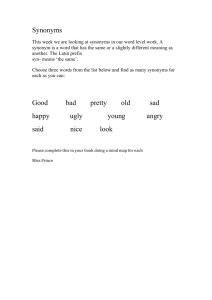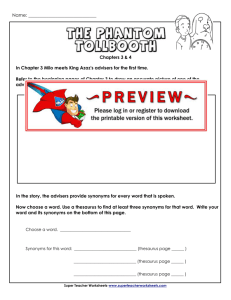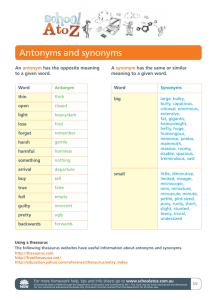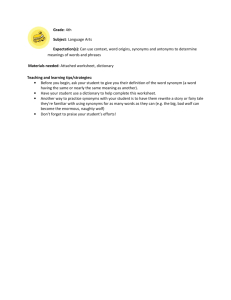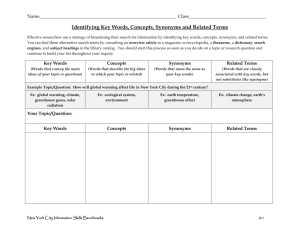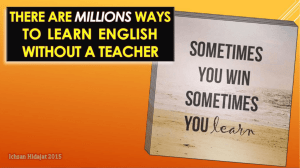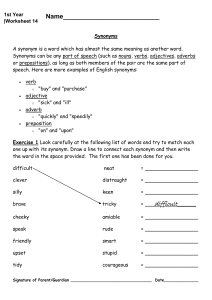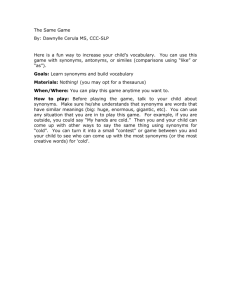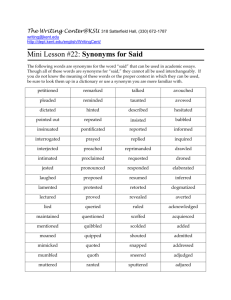Word Choice Lessons - teachingandlearningwithtech
advertisement
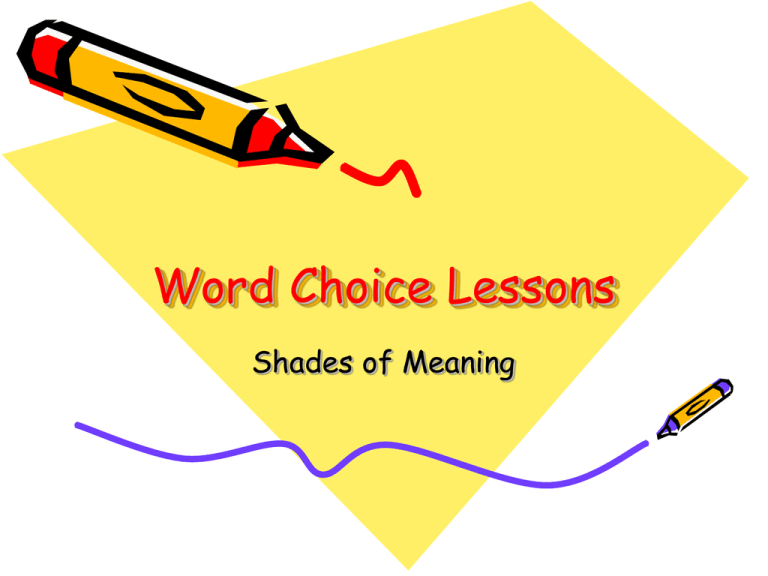
Word Choice Lessons Shades of Meaning Focus of Instruction • Selecting the right synonym to create precise meaning • Identifying specific, descriptive language • Revising to make vague language more precise A Definition… • Good word choice includes the use of powerful verbs, sensory detail, and, variety – which comes from an expanded vocabulary. – Poem or personal narrative: use freedom of expression, use words in creative and expressive ways. Objectives and Skill Focus • Students will be able to understand the nature of synonyms and gain skill in selecting the right word for the task. – Skill Focus: • understanding what a synonym is • locating synonyms for a given word • distinguishing among synonyms by identifying nuances of meaning • recognizing the ways in which synonyms affect reader interpretation Anticipatory Set Imagine if you carried all of your money – bills and coins – in a jar. Imagine also that you just plunged your hand in the jar to pay for things, not caring what you pulled out. What is a ‘Synonym?’ • What is your definition of ‘synonym?’ • Are synonyms exactly the same? – Does ‘vast’ = ‘large’ • Similar words have different ‘connotations’ (an implied or understood meaning) • How many synonyms can you think of for the word ‘great?’ • Look up the word in the thesaurus and add it to your pocket thesaurus Reading from Hope Was Here I took out my Roget’s thesaurus, which lists words that have the same meaning. If you’re a word person like me, you can’t live without one. Say you’re trying to get an idea across, like Gleason Beal is a thief. You can look up the word “thief” in the thesaurus and come up with a slew of better slams to help you work out your intense feelings. Gleason Beal is a… …robber …larcenist …stealer …pilferer …purloiner …poacher …swindler I flipped to the H section. Hope is… …belief …credence …faith …trust …confidence …assurance • Assign synonyms to groups. • Record what you find. • What are the subtle differences in connotations in your synonyms? (use dictionary if needed) Do Parts of Speech change synonyms? • You looked up “Hope” as a noun. What happens when you look at “Hope” as a verb? • List 3 synonyms for ‘hope’ (as a verb) in your pocket thesaurus Shades of Meaning She ran down the trail of messy footprints, past buildings that were shedding snow from their steep roofs, then round the bend at the edge of the town. -- Iain Lawrence. • Take the 4 words in blue – – What part of speech are they? Find at least 3 synonyms for the word. Shades of Meaning (continued…) • Which of the synonyms you found would fit best with the author’s original meaning if you placed them where the old word was? • “She ran down the _footpath___ (trail) of ___muddled__ (messy) footprints, past buildings that were _spilling__ (shedding) snow from their steep roofs, then round the bend at the edge of the town” • Read the original and then read your version. What has happened to the original? A shade too dark • Do the same exercise, but this time plug in the synonyms that make the least sense with the author’s meaning. • “She _hastened___ (ran) down the trail of _disorganization_ (messy) footprints, past buildings that were _structure__ (shedding) snow from their steep roofs, then round the bend at the edge of the town.” • Now what has happened to the author’s original? Closing Question • Hope says that a thesaurus is a must-have if you’re going to be a ‘word person.’ Nevertheless, teachers have been known to say, – “A thesaurus can be dangerous in the wrong hands.” • What do you suppose the teacher meant by this? Acknowledgements • The preceding presentation was based from a lesson printed in WriteTraits: Teacher’s Guide by Vicki Spandel, Grade 7.
